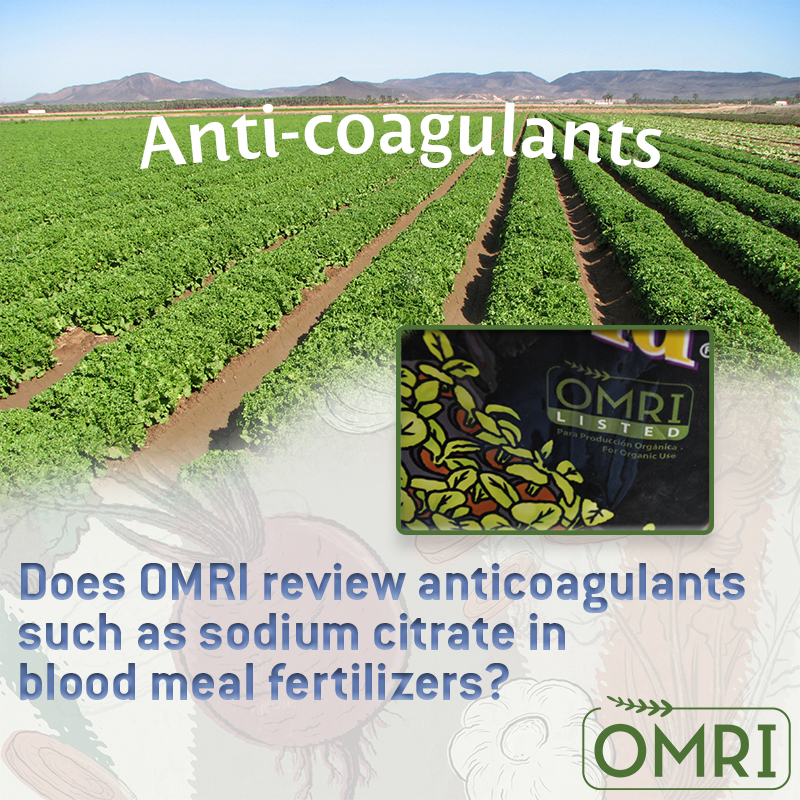Anticoagulants, Including Sodium Citrate
 Does OMRI review anticoagulants such as sodium citrate in blood ingredients?
Does OMRI review anticoagulants such as sodium citrate in blood ingredients?
By Peter Bungum
Animal products such as blood are allowed under the National Organic Program (NOP) regulations at §205.203(c), provided that they have not been chemically altered during the manufacturing process. Blood has been used for millennia as a fertilizer, and it is a good source of nitrogen. Processing blood for use in fertilizers presents specific challenges in modern times. Proteins called clotting factors create sticky fibers which bind cells into a fibrous raft. These clotting factors have obvious benefits to living animals; however, blood processors may need to reduce clotting in some manufacturing processes, and use anticoagulants to do this. For example, sodium citrate can be used to make calcium (a key activator of clotting factors) biologically unavailable. With this said, the addition of anticoagulants to blood destined for fertilizer use is not universal.
In the past, OMRI had no specific policy regarding anticoagulants, and reviewed blood ingredients for prohibited substances on a case-by-case basis. If anticoagulants containing prohibited substances were used, then removal events such as separation (centrifugation), or heating beyond a material’s flash point, were required for the product to be OMRI Listed.
In 2016, at the request of OMRI’s Crops Review Panel (CRP), the OMRI Advisory Council (AC) considered how OMRI should review anticoagulants within blood ingredients (such as blood meal) in crop fertilizers. Blood is sourced as a waste byproduct of slaughterhouses, and the AC noted that it may not be reliably possible for organic input producers to know what, if any, anticoagulants have been used. Anticoagulants are incidental, and products containing blood usually undergo subsequent processing which would remove a substantial portion of these materials. The AC recommended that OMRI should consider anticoagulants to be beyond the scope of review for blood, and that OMRI should not review these ingredients. OMRI’s current policy is to allow crop fertilizers or soil amendments derived from blood without reviewing anticoagulants.
The National Organic Standards Board (NOSB) received a petition in July 2016 to add sodium citrate as a processing aid to the list of materials allowed in crop production, specifically as an anticoagulant for blood. In 2018, the NOSB recommended that sodium citrate be placed on the National List at §205.601 with the annotation “For use as an anticoagulant in the production of blood meal.” After further consideration, the NOP considered adding “Blood meal made with sodium citrate” to the National List, and not the processing aid sodium citrate itself. In a Federal Register Notice from November 5, 2020 , the NOP stated that rule making to add “Blood meal made with sodium citrate” to the National List will not proceed.
Based on this Federal Register Notice, OMRI staff will maintain our current policy on anticoagulants in blood used in organic crop production.
This article first appeared in the spring 2017 issue of the OMRI Materials Review newsletter, and was revised and updated in December 2020 by Technical Director Doug Currier.








